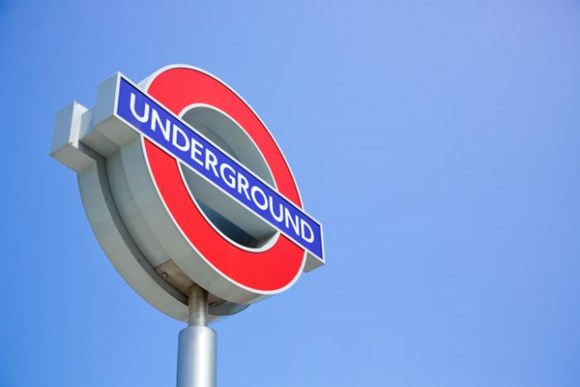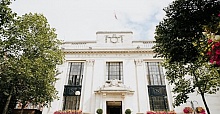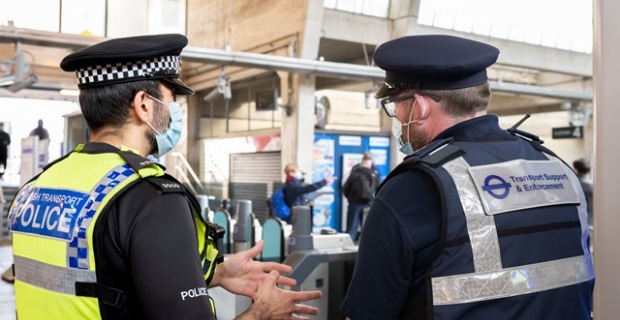Face coverings still play an important role in helping everyone live safely with coronavirus.Independent testing has found no traces of coronavirus on the public transport network since testing began in September 2020 Transport for London (TfL) has made the decision to no longer require customers to wear face coverings as a condition of carriage on its services from 24 February, having considered a variety of factors including the shift in the Government's approach towards living with the virus and decreasing infection rates in London. It has also considered robust evidence about the proven effectiveness of face coverings as well as the results of independent testing by Imperial College London for coronavirus on the public transport network since September 2020 and feedback from stakeholders. The changes respond to the current pandemic situation in London and will allow TfL to continue to provide safe transport services for its customers and colleagues. TfL strongly encourages customers to wear face coverings on its services to drive down transmission of the virus and keep each other as safe as possible. Research suggests a good-quality face covering can help reduce the chance of catching coronavirus and passing it onto others, and face coverings have also played an important role in giving people confidence to use public transport throughout the pandemic, particularly people who are vulnerable.

TfL has seen public transport use grow in recent weeks as London recovers from the pandemic. Last week, TfL was seeing around 2.2-2.5m journeys per weekday on the Tube which was around 60 per cent of pre-pandemic levels and weekday bus ridership is now regularly at around 4.5m journeys a day, about 75 per cent of pre-pandemic levels. At weekends, Tube and bus ridership is even closer to pre-pandemic levels - with the Tube reaching 75 per cent of pre-pandemic levels last weekend and certain times of the day reaching close to 75-80 per cent of pre-pandemic levels. TfL figures indicate that millions of Londoners are regularly using public transport across the city, showing continued confidence that services are safe, clean and reliable.
A near-normal service continues to operate across London’s public transport network and a number of active travel options, including walking and cycling routes in central London and the Santander Cycles network, are available to customers all over the capital.
Lilli Matson, Chief Safety, Health and Environment Officer for TfL, said: “Transport is an essential element of London’s recovery from the pandemic. We have seen increasing numbers of customers return to our network as they begin to return to offices and workplaces, as well as to bars, theatres, restaurants and other cultural venues. That return is due in part to the confidence that Londoners have in our ongoing work to ensure that the transport network is clean, reliable and safe.
"Following the Government’s decision to lift coronavirus restrictions and the falling infection rates in London, we will be removing the condition of carriage that requires customers to wear face coverings from 24 February, but will continue to strongly recommend that customers and staff wear them as they are proven to reduce the risk of transmission and we know they provide confidence to people using public transport. All customers should be assured that the public transport network is as safe as other similar settings, and that independent testing has found no trace of coronavirus on our network since September 2020. We look forward to continuing to welcome customers back to our network as we help London and the economy recover.”
TfL's enhanced cleaning regime also continues to ensure the transport network is cleaner than ever. Trains, trams, buses and stations are cleaned with hospital-grade cleaning substances that kill viruses and bacteria on contact and provide ongoing protection. Independent testing by Imperial College London has been carried out monthly since September 2020, taking swabs of touch points in stations, buses and air samples in ticket halls and has found no traces of coronavirus on the public transport network.
The transport network is also well ventilated. Train and bus doors opening frequently ensures a regular exchange of air across the public transport network, while the constant movement of trains draws fresh air into the system. In the deeper Tube lines, ventilation shafts and fans supplement this air movement.
Assessments on Tube carriages indicate that the air changes over 20 times each hour, more than the six to 12 times recommended by the Rail Safety and Standards Board. Buses, which are cleaned daily, have been modified to keep windows propped open and are also fitted with a range of air extraction and ventilation systems. These systems, in conjunction with leaving windows open and the frequent opening of doors, ensure the flow of fresh air through the vehicle.
TfL also strongly encourages the continued use of face coverings in taxis and private hire vehicles by both drivers and passengers, unless they are exempt. Londoners are also encouraged to use active travel options such as walking and cycling for all or part of their journey. Legible London signs across the city provides local information and potential routes for those walking and cycling. Santander Cycles docking stations are located all over the capital, and the scheme continues to break records with more customers hiring bikes each year.


 Prime Minister Keir Starmer's 2025 Easter message
Prime Minister Keir Starmer's 2025 Easter message After Nesil Caliskan a by-election will be held in Jubilee ward in Enfield
After Nesil Caliskan a by-election will be held in Jubilee ward in Enfield Publishing the analysis, Labour’s Cllr Ergin Erbil said Everybody in Enfield deserves basic rights
Publishing the analysis, Labour’s Cllr Ergin Erbil said Everybody in Enfield deserves basic rights Gaza-Israel conflict Statement from Cllr Ergin Erbil, Leader of Enfield Council
Gaza-Israel conflict Statement from Cllr Ergin Erbil, Leader of Enfield Council The European Union called on Turkey to uphold democratic values
The European Union called on Turkey to uphold democratic values Turkish citizens in London said Rights, Law, Justice
Turkish citizens in London said Rights, Law, Justice The Council of Turkish Cypriot Associations Geneva response letter
The Council of Turkish Cypriot Associations Geneva response letter Sustainable Development and ESG, Will This Become the Course for Turkic World
Sustainable Development and ESG, Will This Become the Course for Turkic World The 'Prince of Paris' has impressed in his first EuroLeague season
The 'Prince of Paris' has impressed in his first EuroLeague season Saran Media And Euroleague Basketball Extend Media Rights Partnership for Four More Years
Saran Media And Euroleague Basketball Extend Media Rights Partnership for Four More Years Will Rangers be Jose Mourinho’s next victim?
Will Rangers be Jose Mourinho’s next victim? Jose Mourinho's Fenerbahce face Rangers on Thursday
Jose Mourinho's Fenerbahce face Rangers on Thursday Barclays has become the biggest UK lender so far to cut mortgage rates
Barclays has become the biggest UK lender so far to cut mortgage rates THE SPRING STATEMENT EXPLAINED, UK ECONOMIC OUTLOOK AND GROWTH FORECASTS
THE SPRING STATEMENT EXPLAINED, UK ECONOMIC OUTLOOK AND GROWTH FORECASTS Launch of Made in Enfield gift shop to celebrate local artists and designers
Launch of Made in Enfield gift shop to celebrate local artists and designers Trial used smart Wi-Fi sensors for live building occupancy data to optimise
Trial used smart Wi-Fi sensors for live building occupancy data to optimise





















